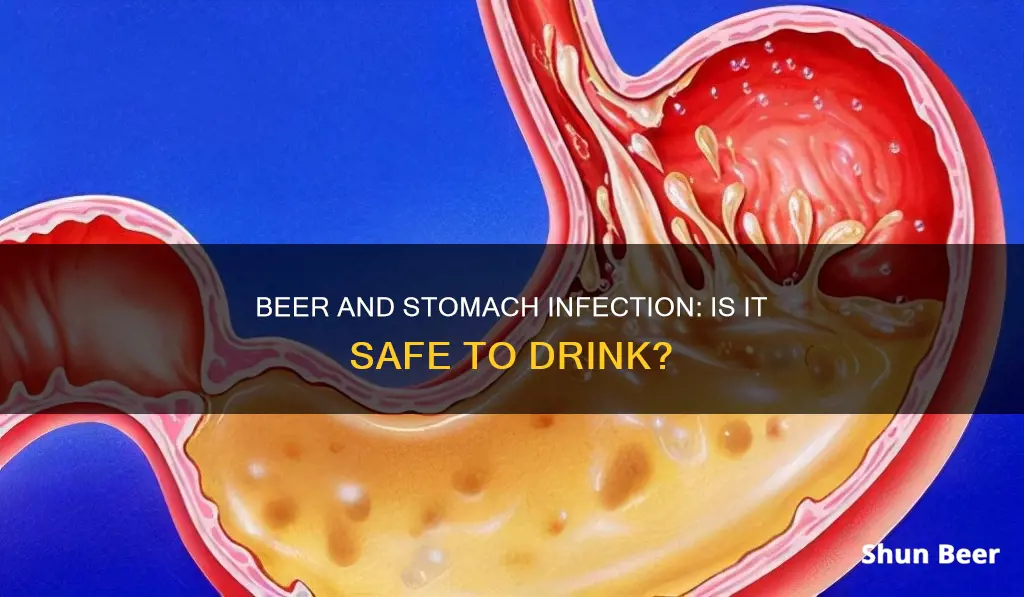
Alcohol is a common irritant for stomach problems and can increase the amount of acid in the stomach, irritating the stomach lining and triggering stomach upsets. This can cause symptoms such as abdominal cramps, heartburn, nausea, and loss of appetite. Regular drinking can lead to alcoholic gastritis, which includes symptoms like stomach aches, abdominal pain, hiccups, indigestion, loss of appetite, bloating, and nausea. Alcoholic gastritis can be chronic or short-lived, and the most effective treatment is to limit or stop alcohol consumption. Beer, in particular, has been found to accelerate gastric emptying, aiding digestion. However, for those with stomach infections, it is generally recommended to avoid alcohol, as it can irritate the stomach and trigger discomfort.
What You'll Learn

Alcoholic drinks can stimulate digestion
Drinking alcohol is a common practice, and it's not uncommon for people to wonder about its effects on their health, especially when facing health issues like stomach infections. While it is well-known that excessive alcohol consumption can lead to stomach pain and other issues, there is also a belief that alcoholic drinks can stimulate digestion. So, what's the truth?
Firstly, it's important to understand that alcohol is a known irritant for stomach problems. Excessive alcohol consumption can lead to stomach pain, abdominal pain, indigestion, loss of appetite, bloating, nausea, and other unpleasant symptoms. In some cases, it can cause more severe complications such as gastric ulcers, gastric bleeding, or even gastric perforation. Therefore, for people with stomach infections, alcohol is generally not recommended and can worsen the condition.
Now, addressing the belief that alcoholic drinks can stimulate digestion, it is true that some people believe alcohol can aid in digestion, especially after a fatty meal. However, this notion is not entirely accurate. While alcohol may provide a feeling of stimulation, it does not positively impact digestion. On the contrary, alcohol impedes gastric emptying, blocking the action of nerves responsible for transporting food in the abdomen. As a result, high-proof alcoholic drinks do not benefit digestion and may even cause further issues.
However, this doesn't mean that all types of alcoholic drinks have the same effect. For example, drinking an herbal liqueur before a meal can stimulate the mucous membranes in the stomach to release acid, facilitating the pre-digestion of foods. But it's important to note that this effect is not due to the alcohol content but rather the bitter substances the drink contains. Similar bitter substances found in non-alcoholic beverages like espresso also have this effect on digestion. Therefore, if you're looking to stimulate digestion, it's not the alcohol that provides that benefit.
In conclusion, while alcoholic drinks might provide a temporary feeling of stimulation, they do not aid digestion. Alcohol can irritate the stomach and lead to various issues, including stomach infections. To support digestion and overall health, it's best to limit alcohol consumption, stay hydrated, and opt for beverages like warm water, herbal teas, or green juices, which can help reduce inflammation and improve gut health.
Sprite vs Beer: A Healthy Alternative?
You may want to see also

Beer is less harmful than hard liquor
Drinking alcohol is listed as an irritant for stomach problems. Alcohol can increase the amount of acid in the stomach, which can irritate the stomach lining and trigger stomach upsets, causing abdominal cramps, heartburn, nausea, and vomiting. Alcoholic gastritis can be chronic or short-lived, and the most effective way to treat it is to limit or stop drinking alcohol.
Beer and hard liquor both contain ethanol, a recreational drug. However, hard liquor is much stronger than beer, with nearly 40% more alcohol by volume. This means that it takes less hard liquor to cause the same effects as beer, leading to quicker intoxication. Hard liquors are also often served as cocktails, which can mask the taste of the alcohol, causing people to consume more.
While both beer and hard liquor can contribute to health risks, including heart disease and liver damage, the higher alcohol concentration in hard liquor means that it can accelerate liver damage compared to beer if consumed in equivalent amounts. Beer has more antioxidants than hard liquor, but the overall effect is small. Hard liquor, on the other hand, often has fewer or no carbohydrates, which is beneficial for those trying to keep their blood sugar from spiking.
Moderate alcohol consumption, defined as up to one drink per day for women and up to two drinks per day for men, is key to minimising the health risks associated with alcohol consumption. It is important to understand what constitutes a standard drink: 12 ounces of beer, 5 ounces of wine, or 1.5 ounces of distilled spirits like liquor.
Beer Before a Urine Test: What You Should Know
You may want to see also

Alcohol can cause stomach pain
Alcoholic gastritis is a condition caused by drinking too much alcohol too often. The alcohol irritates and erodes the stomach lining, triggering gastritis symptoms. Gastritis is inflammation of the stomach lining, and it can cause pain and sickness. It can also be a long-lasting condition. If left untreated, gastritis can lead to stomach ulcers, which can be fatal.
The most effective way to treat alcoholic gastritis and prevent stomach pain is to limit or stop alcohol consumption. This allows the stomach to recover and return to normal function. In addition to reducing alcohol intake, drinking green tea or mint tea, staying hydrated, and eating before drinking alcohol can help reduce the negative effects of alcohol on the stomach.
If you are experiencing stomach pain, it is important to consult a medical professional for personalized advice and treatment. They may recommend lifestyle changes, medications, or other interventions to manage your symptoms effectively.
Beer and Tums: Safe Mix or Not?
You may want to see also

Alcoholic gastritis can be chronic or short-lived
Drinking beer or any other type of alcohol is not recommended when experiencing stomach pain or a stomach infection. Alcohol is a common irritant for stomach problems and can increase the amount of acid in the stomach, irritating the stomach lining and triggering symptoms such as abdominal pain, heartburn, nausea, and vomiting.
Alcoholic gastritis is a specific condition that can develop as a result of misusing alcohol. It is a type of acute gastritis caused by excessive alcohol consumption that leads to inflammation of the stomach lining. This inflammation can be very painful and cause severe stomach cramping, irritability, and vomiting. Alcoholic gastritis can be chronic or short-lived.
Chronic gastritis is a long-term condition where the stomach lining remains inflamed and is worn down over time. Those who consume alcohol regularly may only experience minor symptoms for an extended period due to decreased sensitivity from continued alcohol use. Chronic gastritis can lead to complications such as gastrointestinal bleeding, ulcers, and even stomach cancer.
Acute gastritis is an immediate inflammation of the stomach lining that happens quickly and tends to be much more painful than chronic gastritis. It can be caused by a single episode of binge drinking and can lead to severe symptoms such as nausea, vomiting, and a burning ache in the stomach.
The most effective way to treat alcoholic gastritis, whether it is chronic or short-lived, is to limit or stop alcohol consumption. This allows the stomach lining to repair itself and prevents further damage. In addition to alcohol withdrawal, treatment for alcoholic gastritis may include medications such as antibiotics, proton pump inhibitors, and antacids, as well as lifestyle changes such as eating a bland diet and managing chronic stress.
Drinking Beer with a Straw: Faster or Fiction?
You may want to see also

Treatment for alcoholic gastritis
Alcoholic gastritis is a condition characterised by inflammation of the stomach lining caused by excessive alcohol consumption. It can be acute or chronic, with symptoms ranging from mild upper abdominal pain to nausea, vomiting, a bloated feeling in the abdomen, and regurgitation of food.
The most effective way to treat alcoholic gastritis is to limit or stop alcohol consumption. This allows the stomach lining to heal and prevents further irritation and inflammation. In addition to alcohol cessation, medication and lifestyle changes can also help alleviate symptoms.
Medication
- Antibiotics to kill bacteria that cause gastritis
- Antacids to reduce stomach acid
- Histamine (H2) blockers, which curb how much acid your stomach makes
- Proton pump inhibitors, which treat stomach ulcers and reflux
Lifestyle Changes
- Eat a gastritis-friendly diet: Consume easily digestible, bland foods like rice, bananas, and lean proteins. Avoid fried, fatty, spicy, acidic, and heavily seasoned dishes.
- Stress management: Engage in stress-reducing activities like yoga or deep breathing exercises, as stress can exacerbate gastritis symptoms and hinder the healing process.
- Stop smoking: Smoking can worsen gastritis symptoms and increase the risk of developing stomach ulcers and cancer.
It is important to consult a medical professional for a proper diagnosis and treatment plan for alcoholic gastritis.
Temporary Crowns and Beer: What You Need to Know
You may want to see also
Frequently asked questions
No, it is not recommended to drink beer or any other alcoholic beverage if you have a stomach infection. Alcohol irritates the gut and can cause or worsen gastritis, a condition in which the stomach's inner lining is inflamed or worn down.
Gastritis is a condition where the inner lining of the stomach becomes inflamed or worn down. It can be acute or chronic, with acute gastritis causing severe pain and swelling that appears quickly and without warning. Chronic gastritis, on the other hand, is a slower and duller version of the condition, with symptoms that come on gradually and persist over time.
Symptoms of gastritis include a sharp stomach pain or burning sensation, acid reflux, indigestion, persistent stomach discomfort, and pain at meals or during sleep. Other symptoms may include abdominal pain, hiccups, loss of appetite, bloating, and nausea.
The most effective way to treat gastritis is to limit or stop alcohol consumption. This allows the stomach to recover and reduces the risk of more serious medical issues such as gastrointestinal tract bleeding, bowel blockage, ulcers, mucous membrane tears, anaemia, liver damage, and stomach cancer.







